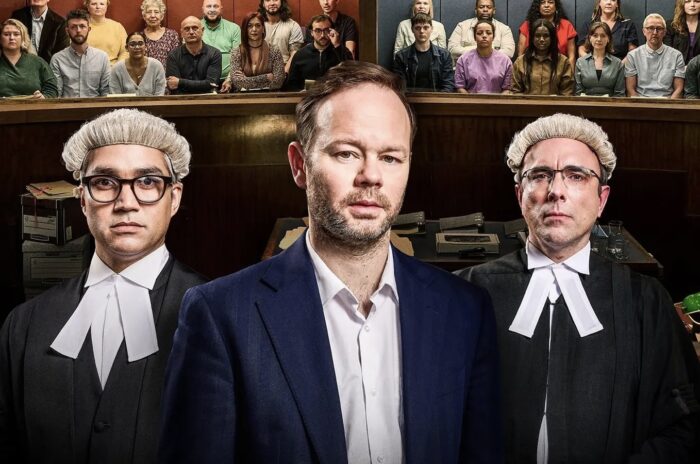Why you should watch Channel 4’s The Jury: Murder Trial
Review Overview
Dramatisation
6Debates
8Disturbing potential importance
8Ivan Radford | On 17, Mar 2024
One in four court cases with juries are estimated to have incorrect outcomes. That’s research quoted in the first episode of The Jury: Murder Trial, and it’s the justification for Channel 4’s reality TV series. The four-part programme is pitched as a social experiment – think Big Brother meets true crime – but it’s closer to The Traitors meets Twelve Angry Men.
The series has an irresititible premise: a real life trial is re-enacted (with all the names, etc, changed) for an audience of jurors who must then decide their verdict on the case. But, unbenknownst to the jurors, there are two panels of 12 in play. Will they end up reaching the same verdict?
The case in question involves John (Sam Alexander), a sculptor who killed his wife, Helen (Kate Sheridan), at their rural home. With no history of violence, until the fateful day he strangled her and hit her with a hammer, it’s an apparently out-of-character act – which means the jury must decide whether he’s guilty of murder, intentionally killing someone else, or manslaughter, having lost control in the moment with no idea of what he was doing. The latter comes with a lighter sentence, but with little evidence to go on, making the call either way is hard to prove.
The programme gets off to a rocky start, as it lays out the case and establishes the set-up for us at home. From the off, it becomes clear that this isn’t a fully faithful recreation of the trial process – we don’t see the jurors sworn in or the legal definitions and other information related to them. We also don’t see the case verbatim, instead observing snippets of the defence and the prosecution (the wrong way round), and it’s not clear whether that’s an editing decision for viewers at home or what the two juries actually experienced. Quotes from testimonies given at the time of John’s arrest are also acted out as a monologue by Alexander in a police station, while character witnesses are also filmed separately – a device intended to take us into true crime drama territory, but one that also takes us away from the business of the justice system in action.
Once you move past these kind of theatrical flourishes, though, the series finds its stride – and that stride is firmly rooted in simply watching the members of the jury debating the case with each other. In real life, they’re not allowed to do this until the final deliberations (which take place in a closed room, with nobody outside the jury allowed to witness the conversation), but the show has to convey for viewers the internal dilemmas and doubts that each juror is going through as the case unfolds in all its twists and turns.
Of course, the jurors are aware that they’re on camera, so you suspect that some are partly acting up for the audience, but there’s still something riveting in watching how a group of people strive to reach a consensus. They individually tell us some of their stories, which have elements that echo parts of the lives being examined, and their ability to relate to or sympathise with different people and details repeatedly colours their judgements. Some are biased and blinked, some are moved by John’s body language, some are determined not to be swayed from their initial opinions, and somewhere in the melting pot of these experiences lies a fascinating study of how we all construct stories to process and explain the world around us.
The power imbalances within each jury are a particular source of tension, and by the time we reach the gripping final episode, it’s alarming to see how some will punch the air to celebrate convincing someone else to agree with them, even if their reasoning is entirely sound. Others feel that peer pressure, while one poignantly observes that, although they feel one thing is true, the law requires that they vote something else because of strict legal definitions – what’s the point of a jury, they ask, if they can only do what the laws says anyway?
One talking head at the beginning describes the jury system as a spin of the roulette wheel. While that feels like a bit of an extreme description, Channel 4’s programme does highlight the vulnerabilities of the whole idea, particularly in the modern age of echo chambers and always-everywhere information. Is the jury system still fit for purpose? Does it need a wider panel or a different approach? Is it, like this flawed but potentially important series, simply the best option we have? Roll on The Jury: Criminal Trial and let’s take another vote.

















